Jurassic World and the Sci-Fi Renaissance
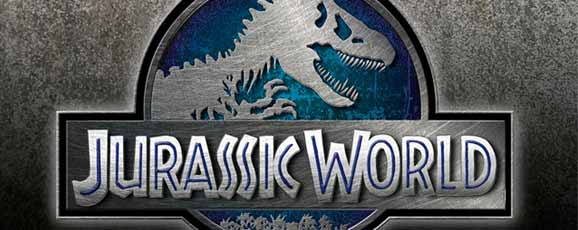
It is a truth universally acknowledged that there is no such thing as too many dinosaurs. Take a walk around your local museum and you will see children of all ages managing to articulate the complicated Greek and Latin names, jumping excitedly and tugging on their pet adult’s sleeves trying to instil just as much excitement and enthusiasm for just how damn big these things are. More often than not they’ll manage this with an articulation that adults themselves have lost or, worse yet, never possessed. And if on your antiquities perusal you see a little dot of a trainee-human, all snot and cuddles, getting their Haribo encrusted mouths around “Acrocanthosaurus” and “It’s Ornithiscia mummy! That means they’ve got bird hips!” you will undoubtedly be uplifted by seeing this joyous intrigue into the natural world. If you aren’t, I strongly question what the bloody hell you think you were doing in a museum in the first place.
Prehistory in the Making
To many of us the Mesozoic world is our first insight to natural history and by extension into science and by further extension into science fiction. And why shouldn’t they? These animals capture the imagination without being imaginary. They occupied our self-same world and lived and died with equal if not greater ferocity and excitement as animal life today and represent the raw and awesome powers of evolution, red in tooth and claw but from the safety of being sixty-five million years away from us. I imagine we all feel a little ballsy with that kind of barrier between us and a threat.
But in our masochistic way as a species, we have wanted to bring that barrier down since Richard Owen named his ‘terrible lizards’. The dragons of fantasy are by and large out, the dinosaurs of science fiction are more of a permanent fixture. In many ways, the aesthetic and cultural gulf between dragons and dinosaurs is comparable to the gulf between Tim Burton’s and Christopher Nolan’s take on Batman. That is just a thought of course, but keep it in mind- it may prove influential in the latter part of this composition.
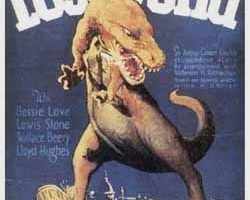
The point is, the fact that these animals really existed tantalised our literary taste buds and quickly became defining additions of our science fiction. Most importantly, there was a desire (here’s that masochism I was talking about) to put humans and dinosaurs on the same field of play and watch as carnage and rip-roaring, largely colonial adventures ensued. The genre of fiction known to English students around the world as ‘Lost World Fiction’ is epitomised by Arthur Conan Doyle’s novel of the same name, where the modest Scottish optician swaps Baker Street hijinks for tropical prehistoric threat. But here lies the rub; for the greater part of their literary and especially cinematic career our most treasured former planetary tenants were little more than rampaging, salivating reptiles who had recently discovered a taste for mammalian flesh. And that’s fine, there’s absolutely nothing wrong with that especially if you want to sell popcorn. Anybody who wishes to challenge the integrity of Willis O’Brien or Ray Harryhausen has their choice of sword or pistol and we’ll settle it like gentlemen.
The thing is, that for a very long time our full understanding of these animals was as enormous (and occasionally surprisingly little) beasties living in tropical swamps millions of years ago, spending their entire lives eating each other until they weren’t alive anymore. This was largely all science fiction writers and film makers had to go on and they can’t be blamed for using the information they had to hand.
Then along comes Michael Crichton with what was, I think it fair to say, something of a game changer. While the actual biological mechanics of his techno-thriller Jurassic Park is a little ropy, though warranting some serious consideration, it portrayed these animals in a way that was almost alien to the genre or to audiences’ minds in general. That being the fact they were animals. I am getting off topic a little here, but that is our first port of call. It raised questions about our perceptions of extinct animals which is itself a major theme of the book. How can you possibly anticipate the behaviour of genera that is so utterly alien to you? It has more in common with John Wyndham’s Day of the Triffids, where the characters try to comprehend the behaviour of mobile, pseudo-sentient plants to survive, than it does with Conan Doyle’s The Lost World.
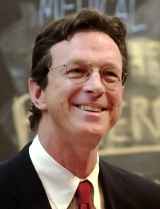
Like all works featuring the extinct animals, Crichton relied almost wholly on the (at the time) up to date palaeontology with a few dabs for colour (example: there’s no way of proving whether or not Dilophosaurus was in fact poisonous, but by god it makes for a formidable predator). Quite a lot of that palaeontology is out of date now, but it is amazing how much the portrayal of dinosaurs in this franchise (we’re getting to that bit now, hang tight) account for people’s interpretations of what is correct. Vocal abilities and neck flexibility of sauropods for one, the lack of feathers on the cretaceous theropods for another, but the one that riles most dinosaur enthusiasts (and you know who you are and you know how grand it makes you feel to point this out to people- lord knows I do) is the size of the Velociraptors. Just very quickly; Velociraptors were tiny in comparison to their portrayal in the novel and films and this inaccuracy lies purely in the fact that at the time of Crichton’s novels some palaeontologists considered the larger Deinonychus to be a form of Velociraptor. There, that’s enough of the biology seminar- let’s get down to some science fiction. You’ve been very good, there’ll be ice cream after this don’t you worry about that.
“Welcome To Jurassic Park”
While Crichton was a writer more closely associated with the techno-thriller genre, the Jurassic Park franchise is undeniably a science fiction staple. It is part of the science fiction lover’s balanced breakfast as it where. There are so many reasons for this but I suppose the main point is that it follows in a long line of cautionary tales most associated with the genre. A sort of hybridisation (rather ironic when you consider the comparisons I’m about to draw) of Mary Shelley’s Frankenstein and H.G Wells’ The Island of Doctor Moreau in ways that I don’t need to point out. The very fact you’re reading this article proves you know the point I would have made, making a young writer’s job really rather easy it must be said.
A good cross-section of people have read the novel, some have read the sequel (though I personally wouldn’t recommend it- I don’t like novels where the writer’s hand has been forced) but we all know the film franchise. We can quote it, we know the music and there are scenes that formed a major part of our cultural awakening. You remember being a child and staring goggle-eyed as the Brachiosaurus strides up the side of the hill. Our imagination was ensnared again. There was no question of CGI (who the hell knew what THAT was?) or animatronics, these were the real deal. And there’s the point of the films; Spielberg had done on film precisely what Crichton did in print. These were not cinema monsters, these were animals to be portrayed as close to life as was at the time possible. How many films have a resident academic with a seat beside the director and Stan Winston’s number on speed dial? A damn sight more nowadays because of the 1993 film it seems fair to say.
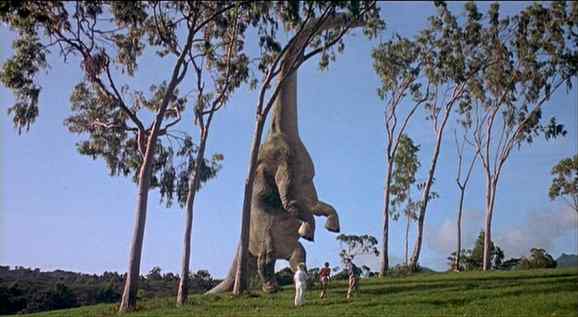
Spielberg’s film Jurassic Park is stunning science fiction because he balanced creative imagination with cutting edge scientific understanding. If Jack Horner wasn’t happy with something, it was changed for the better. But this is not the real reason I think the films are innovative in science fiction cinema. In the screenplay, David Koepp and Crichton himself made one significant change from the novel in the character of the Park’s owner John Hammond immortalised by Richard Attenborough. In the novel, Hammond is little more than an ardent capitalist, a selfish money driven eccentric with little if any grasp on reality and is eventually killed at the end of the novel by his own creation. That’s a bit of a spoiler I suppose if you haven’t read the novel. Whoops. Crichton referred to this character as “the dark side of Walt Disney”, a note that is at once bang on the money but also raises the assumption that Walt Disney didn’t have a dark side. But that is a different point for a different essay.
In the films, Hammond has just as little grasp on reality but he is more naïve than wilfully ignorant. And here is where he differs so importantly from the rest of the Frankenstein literary dynasty. How many times have we seen a character rush in where angels (and indeed devils) fear to tread, to overreach the levels of man’s abilities and suffer the horrific consequences- only to die or their creations be destroyed or indeed more commonly both? It is a tradition laid down in the renaissance with Marlowe’s Doctor Faustus and was going strong even in the finale of Crichton’s novel. The creator never takes responsibility for his actions outside of destroying the evidence or trying to save his own skin (as a side note: it is more commonly male characters who have this tendency. I expect a full report from somebody on this question).
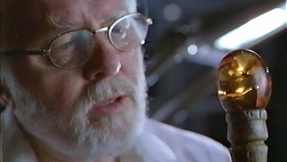
Spielberg’s, or more correctly Attenborough’s version of Hammond is very different. He very quickly becomes more concerned with the lives he has put at stake and takes control of the situation as best he can. He agrees that his creation must never be released, but laments it at the same time and our last image of him is in quiet contemplation about the full repercussions of what he has done. The entire plot of the sequel film (also directed by Spielberg) is hinged upon this Frankenstein character doing what none of his predecessors had done before- taking responsibility. Rather than plunging into the depths of gothic despair, we see the cinematic Hammond step up to the plate and seek redemption for his actions by protecting his creations and keeping them separate from the greater world. While The Lost World: Jurassic Park is somewhat an inferior film to the first, it is a complimentary effort that long with the original suit each other decidedly well. You can think of it this way; The Lost World: Jurassic Park is the cufflinks, the tie pin and the watch to go with the original three-piece suit. The first two films became a bench mark in science fiction cinema because the tone and themes throughout were almost unprecedented in mainstream cinema- making history (and prehistory) at the same time. Wouldn’t it have been lovely if it had just stayed there?
But no. 2001’s Jurassic Park III (not warranting an original title apparently) blew this to the wind and ironically proved Ian Malcolm’s predictions about complex systems being fundamentally unsustainable. Talk about life imitating art. The franchise engine got a hold on InGen’s ill-fated experiment and took it away from an admittedly very lucrative but never-the-less near perfect jewel in the crown of science fiction cinema by turning it into what Variety Reviews Derek Elley called “an all action, helter-skelter, don’t-forget-to-buy-the-computer-game ride”, which I rather fear the producers may have considered a compliment. The examinations of character types and a revaluation of the cautionary science fiction tale was abandoned and became nothing more than a no-holds-barred two-hour chase around CGI island. It failed to take note of two basic rules for the genre, namely that less can be more and that if you haven’t got anything new to say, don’t say anything at all.
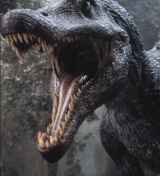
This is not a review of Jurassic Park III, because to be frank if I began to unravel everything that was wrong with that film and why it’s very existence makes me feel sick to the pit of myself I don’t think I’d ever be able to stop. Though, one note to prove my point. How on earth can you suddenly shoehorn in a new, bigger, meaner super-predator in the form of the Spinosaurus on a tiny island with a delicate ecosystem that no one in the previous instalment thought fit to mention or even note the existence on? Unless of course, you’re only thinking that bigger is always better and everyone will agree with you and your merchandising. Still, this is not a review of Jurassic Park III like I said, much less a biological treatise, but all that I have mentioned so far exists purely to structure my point as to how Jurassic Park became its own keystone predator in science fiction cinema before unfortunately falling headfirst into the franchise machine and being rendered unrecognisable in 2001.
Breaking the Window of Opportunity
Though after twelve years of painstaking research (read: flogging a dead horse) it seems that Universal scientists have managed to extract just enough DNA from an extinct cinematic giant to recreate it for this decade. As you will undoubtedly be aware, 2013 saw the announcement that finally after years of speculation the fourth instalment of Crichton’s dinosaur extravaganza will be coming to our screens some time in 2015. Entitled Jurassic World, the final announcement of its production, title and tentative casting (at the time of writing it is thought Idris Elba will be featuring in the piece which is, frankly, brilliant) brings to an end the volcanic torrent of speculation, the ebb and flow of the fan’s own ocean. Except, of course, it hasn’t. If anything it has only served to bolster the wagging of tongues and thoughts and considerations of what this film will be. The disappointing thing is that as Jurassic Park is a part of our common mythology, we can imagine the film we want to see and essentially watch the perfected version in our heads- rendering any material effort worthless and ultimately unsatisfying. This is the trouble with established mythologies- you can’t please any of the people any of the time. Good news for internet reviewers, not so much for filmmakers.
In the intervening decade-and-a-bit between Jurassic Park III and the then unknown fourth installment speculation of just what it would be has ranged like a polar bear from the sublime to the ridiculous. Who would be in it, who would write it, who would direct it, various combinations of the original films cast spoke of an underlying desire to return to form and pretend Joe Johnston’s offering never existed. But various stumbling blocks (namely the unfortunate and truly regrettable deaths of Michael Crichton and Stan Winston who really were the true creative forces behind the series) raised questions about whether or not a fourth film would ever happen at all. And so the rusty gates of Development Hell creaked open and John Hammond shepherded his dinosaurs to the beckoning arms of Ghostbusters 3 and Halo.
So many ideas cropped up and a few tantalising pieces of ‘concept art’ wet appetites internet-wide. No one seemed to notice that most of these pieces had a link to someone’s Deviant Art account, though that is very much by-the-by.
I followed the news regularly with the usual fashionable dismissal and huffs and rolling eyes because, as a writer, I clearly knew best. But when Colin Trevorrow appeared on the scene and I read the news circulating his project I had to lean back and blink a few times in thought. Not only because he looks like a future version of myself (no, seriously) but that the tidbits he has provided gave me pause for thought. A return to Isla Nublar, the island from the first film? We’re going back to the original Jurassic Park? ‘Well, well’ I thought ‘proceed Mr. Trevorrow’.
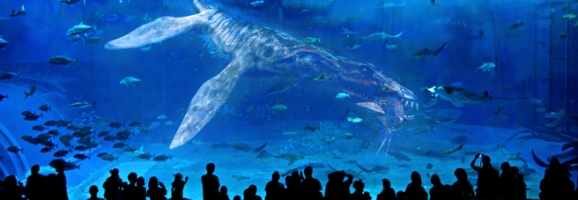
Colin Trevorrow is a marvellous director, anyone who has seen his so far only feature Safety Not Guaranteed will know. Though even if you did not like the film or had reservations on Trevorrow as a director, you can at least admit that he is an original and very, very interesting eye to have behind the camera.
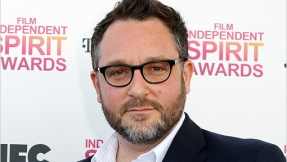
Unlike the Oscars, they don’t just hand out Independent Spirit Award nominations to anyone. Some speculation (good lord, this essay seems to be composed of only three words- genre being one of them) about the plot of this film is even more interesting. In brief; the idea seems to be that Jurassic World is a highly successful dinosaur safari park, the animals safely contained and receives millions of visitors a year. It is only then that things go wrong. Now, this is only speculation at the moment but the scant amount of evidence we have seems to fit this theory. If it is good enough for paleontologists, it is good enough for movie goers.
This is great, this is grand if it is true- though of course it is only speculation. But what if it is true? Is this an alternate history? Is this a film that asks the question “what if Jurassic Park had worked?” It is a tragedy that Richard Attenborough is unlikely to feature in this installment, though present or not his character would be instrumental to it. ‘Finally!’ I thought, as I’m sure most of you did as well, ‘something new! Something other than people I don’t care about being chased around an island for two hours!’ At the same time it put to bed all those pesky rumours of reboots and ten-a-penny remakes of a science fiction giant. Could it be that, with a director on the brink of true greatness, ‘Jurassic Park’ would be saved from the brink of extinction with a timely conservation and breeding program that puts Edinburgh Zoo to shame? No. The bubble burst. As Aldo “The Apache” Raine so rightly taught us- if an offer sounds too good to be true, it ain’t. Jurassic World will, almost undoubtedly, save the franchise but it will not do for the genre what it has to.
On the 20th of March this year Trevorrow posted on his twitter count two words that removed all chance of his film leading the sci-fi renaissance so desperately needed. “No Feathers”. And neatly we arrive back to our biology seminar and concerns for movie monsters over the portrayal of real animals in an alien environment. The evidence for feathered dinosaurs is better documented now than during the first film or indeed the novel, which took a major risk in bringing the concept of dinosaurs being more like birds than reptiles to a wider audience. Though so many people are thrilled with the fact that there will be no feathers on the dinosaurs of Jurassic World. So the creatures Crichton and Spielberg put together for us have finally become nothing more than movie monsters. We may as well tie it in with the upcoming Godzilla reboot in 2014 for all the difference it will make- although I am looking forward to that.
The difference is Godzilla does not pretend to be anything other than a good old-fashioned popcorn selling, cities decimated, monster mash. It has a nobility in the fact it doesn’t dress itself up as anything other than what it is. So once again the chilling image of the franchise machine (somewhere between the Ford production line and the Ministry of Truth) gives us what they think we want rather than trying to portray something new and seeing if it works. Here is a culture of rampant, tyrannical cowardice.
We are looking at a superb moment of opportunity here. But Trevorrow’s tweet is cause for concern and it encapsulates in under one hundred and forty characters what I have taken an entire essay to say. As I said, Jurassic World may we prove to be a good film and I will certainly be going to see it come 2015, but what we know so far is the same old trappings. Shoehorning in more and more cinematic dinosaurs for their “terrifying” value is reducing these sorts of films back to their middle twentieth century counterparts. I am reminded of Terry Gilliam’s comments on “baby-food films”, that if you were to eat nothing but baby food sooner or later you’d think it was pretty tasty. A film like this has the chance, indeed the duty, to put something else on the plate in front of us as an audience and say “this is something I just cooked up, I think it’s good but what do you think?”. Variety is the spice of life after all and the mingling of scientific advances and understandings with cutting edge filming and storytelling techniques can and would produce groundbreaking cinema, a brave new world for the genre. But it is my regrettable conclusion that if this revolution is ever to happen it won’t be with Jurassic World and Universal Pictures.
The main problem underlying this? Science does not sell. The audience is acclimatised to particular version of dinosaurs in cinema, just as they had when Willis O’Brien and Ray Harryhausen were intricately rearranging their armature beasties, and no one is apparently willing to bring these concepts up to date and risk their audience losing their attention. This negates the oldest rule of cinema which is quite simply that your audiences attentions are caught by things they have never seen before, not the same things repackaged and haphazardly moved around like an awkward coffee table in a strangely dimensioned room.
In order to remain marketable, they must be predictable and safe. Perhaps I am just an old idealist, but new ideas and concepts must be held up against their ability at the box office rather than their merits in telling a great story and pushing the boundaries so that when we buy our tickets at said box office we never quite know what we’re in for. Science fiction suffers from this terribly so much so that it is aloud to fall into the realms of science-fantasy (not that there is anything wrong with that particular subgenre if it was the original artistic intention) rather the more speculative and questioning form the creative team had in mind all along. Instead, we are given the same old space-operas, thoughtless time travel and biologically impractical dinosaurs.
Come to think of it: the more you think about this dilemma, the more you realise how the concepts and ideas of science fiction cinema come to be embodied in the dinosaurs of Jurassic Park. Huge, powerful, ground shaking yet chained and fenced in for their entertainment value by those who man the franchise machine. Unexpected behaviour is quickly stamped out, but they can’t yet get into the defining fibres of this genre and alter it, as it were, genetically. Independent filmmakers and writers approach big-budget standards with leaps and bounds every single year as industry standard technology comes within the reach of more and more imaginative people who want to take a stab at science fiction. The creative team behind District 9 seem to have caught their foot slightly in the gearing mechanisms of the franchise machine with Elysium, but they are more than capable of pulling themselves free.
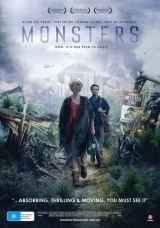
The spectacular Monsters left a little to be desired, but it showcased the tremendous energy and potential bound up in independent sci-fi. Gravity promises to do exactly the same. Across the board we can see an evolution in tastes and techniques that shows when it comes to the balance between action and science you can have your cake, eat it and accept that it is a lie all in one go.
Perhaps Jurassic Park should be rebooted after all, remade from scratch with a whole new look at the age-old story structure but with the technologies brought up to scratch for the current decade. The animals portrayed in the way we now consider them, the flaws of modern computing, the advances in genetic science that have come along since the franchise began (anyone who has read the April 2013 issue of National Geographic will know that de-extinction is more close to reality than it was when Bob Peck met his “clever girl”). So perhaps a remake is in order and perhaps it should be entrusted to a group of independent filmmakers who represent the future of the genre and who could establish this new cinematic movement by breathing their new and special brand of life into these old, old creatures. Science fiction, above all other genres, belongs to the people who hold it dear. Science fiction fans don’t want to be told what is good, largely because we have a hell of a time deciding just what is ‘good’ exactly, but the one thing we admire above all else is creativity and the willingness to try something new.

This theoretical independent reboot may only get points for trying, scraping a B+ grade but at least we could see that the genre we love is being handled by people who love the genre as something other than an invoice from the action figure manufacturers. Though personally, if there is one director to tell Crichton’s story for the drastically changed two decades since the first film was released and give it all the splendour and intricacy it warrants, I would hand the job to our friend Christopher Nolan. I’ve put some thought into what that film would look like, and if you just consider it for a moment you’ll see what I’m getting at.
Science fiction evolves and changes every few months or so and it seems that only independent filmmakers have the work ethic and respect for their audience to become excited by and pursue new ideas. The franchise machine (a phrase and image I hope will come to haunt you) looks like a steam traction engine besides the Air Bus in comparison to this new age. The distributors have a lot of ground to cover, a lot to catch up on or else hand back one of the most lucrative genres to those who care for what they are doing and then, quietly and inevitably, go extinct themselves.
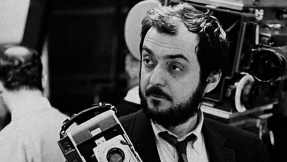
– Stanley Kubrick
Some cynical and probably rather smelly people still view cinema as a vulgar medium and ill-suited for the expression of great ideas. The Big Screen, the Small Screen and even the little-weeny-tiny screen acknowledging how much the independently minded Kickstarter generation on Youtube has become prominent in the genre (there’s that word again), can really bring out the snob in some people. And while it is true that screens of any size may seem too small to encapsulate the complete complexity of some science fiction masterpieces in a way that does their originators proud, I would like to direct these people to a quote from Mr. Stanley Kubrick who said that if it can be imagined or written down then it can be filmed. I may be paraphrasing there, but this was from the mind who gave us 2001: A Space Odyssey and turned the medium on its head.
Science fiction is about ideas, pure and simple. And truly great science fiction is about ideas that never really go away. The Island of Doctor Moreau, The Day of the Triffids, Do Androids Dream of Electric Sheep? and Jurassic Park itself would not exist without the defining and eternal themes of Frankenstein. They are simply the same idea addressed and expressed differently, which is what being human is all about. Two people having different expressions on the same stimulus is called a conversation. So there is no need to worry about plagiarism or repeating yourself as long as you say it differently and hopefully something new and more defined. Ideas move and change with the times and it is reflected in our more visually ambitious cinema genres more immediately than any others. It is a critical and criminal mistake the think you can squeeze and idea into a tube and cut pieces off like black pudding, dishing it out year after year after year. What follows from me is plagiarism, shameless plagiarism, to make a point.
Ideas in film have a life of their own. Ideas, like life, cannot be contained. They crash through boundaries painfully, sometimes even dangerously. Science fiction films, and by extension all films, require the absence of cynical moguls and their franchise machines, not their help. If they would only step aside and trust in filmmakers- life will find a way.
What do you think? Leave a comment.











Very nice piece of writing here. One thing I really missed in all movies (except for a small part of JP2 actually) is the sense that people can have actual control of the situation for a while. In the first book they were bringing the park back up to speed after the first incident with the T-Rex (Lead by Robert Muldoon, given to Roland Tembo in TLW tranquilizing the T-Rex.) This made it really feel like a park, controlled by people, of course all hell broke loose after that. Just the part following in TLW was again monster-movie and not serious…
I look forward to the new film, always enjoyed theses and Dinos are long over due back on our screen.
I do think ‘The Lost world’ was pretty naff, worse then the 3rd that’s for sure but it’s still watchable. I just hope this is the 4th film and not a reboot, I also want to see some of the original cast members return to tie it all together.
I’ve been following the production online and everyone keeps saying save Jurassic World or something like that, I’m confused, when was Jurassic World in hot water? They have a great cast so far, even the kids are good. One of them did really well in this year’s Kings of Summer movie. Bryce is an awesome actress as well. The director and writer did amazingly well with their debut movie, Safety Not Guaranteed. And now Idris Elba and Josh Brolin might be included. I’d say this was climbing the ladder since the beginning….well after being in development hell lol.
From what I understand, Steven Spielberg is acting as executive producer and was unwilling to go forward with a script that wasn’t absolutely perfect. Apparently he has spent twelve years knocking various pulpy ideas out of the park in preference of… something else. Then there were the deaths of Michael Crichton and Stan Winston, all manner of things just kept getting in the way. I think a lot of people decided that a difficult development was the same as the film not happening at all. Definition of “Film Lover” – people to whom patience is never a virtue, it’s the thing between you and dinosaurs.
Great write up man! JW is going to be a beast!
So who else is excited for Godzilla?
Thank you very much. I think The Artifice may collapse in on itself when ‘Godzilla’ is finally released. A testament to his awesome destructive ability as his efforts reach cyberspace.
Anyone know of there’s a dinosaur game coming out anytime soon? I’ve beat Jurassic the hunted dozens of times and would like a new game I’d even buy a new console if it released an awesome Dino game
Theres a kickstarter campaign to have a game called jurassic battleground built.
Some of the best dinosaur games I remember were on the PS1 of all things. The original Turok games were in the so-bad-they-are-good category, but Dino Crisis was an absolute gem in a late 90’s first-Half-Life game kind of a way.
If Jurassic World is about a new park, I suppose they could’ve called it Return to Jurassic Park, or something along those lines. However, including the word “World” in the title indicates, to me at least, that the film-makers are going to up the ante for the next film and taking things in a new bold direction, which I think is a good thing. Weather that means a new park, or dinosaurs destroying the current ecosystem and reclaiming the world, or something else entirely has yet to be seen.
The eco-thriller idea would be fascinating, and if that turns out to be the case then come 2015 I will happily write another article retracting my negative statements here. The new park hypothesis featured here is based only on what is circulating at the moment… two years before the damn film even hits the cinema.
Jurassic Park + The Lost World = Jurassic World.
I’m a 100% going to see this no matter how it will turn out. Simply because I just love the franchise. I saw the first one opening night as a kid and saw the other two in the theater as well. I think a lot of it is a loyalty to something that I enjoyed so much as a kid. I imagine it’s similar to how Star Wars fans feel. Seriously, I’d go see “Jurassic Mars: Life Found a Way” if they made it… I think. Ha. The only thing that sounded too weird, sci-fi and un-Jurassic Park to even bother with at all was the infamous dinos with guns thing.
It makes me feel like a Rugrat to admit that I was exactly one year old when the first film came out, but I remember being spellbound and truly, utterly terrified in equal measure. The armed dinosaurs and the weird mutant dino-men inspired some good old fashioned kick-ass fan art and if if someone was going to write a comic on that theme I’d read it and read it and read it until the staples fell away. “Jurassic Mars” has such potential! Have you seen “Planet of Dinosaurs”? Great B-Movie, and could give you an idea of what your hypothetical may look like.
District 9 is my favorite scifi of the past decade but Elysium disappointed I must say. I am interested in Jurassic World as long as I remain convinced that they have something good up their sleeve and not another lazily written mess like The Lost World or another plotless Jurassic Park III. There are so many things that can be done with Jurassic Park, yet neither of the two existing sequels did anything with them. They were content to just throw dinosaurs at us minus a good, compelling story that actually builds on the consequences of bringing dinosaurs back into our modern world. Please deliver something that has some depth to it instead of just another action movie where people mindlessly run from dinosaurs.
Out of interest: how would you, as a film fan, respond to all the talk and speculation about a reboot or (god I hate this word) ‘reimagining’? It seems to be a fad at the moment, but would JP get something from it the others don’t/haven’t? Just a thought.
I’ve come across some poor storyline pitches for JP4 the past years. While some of the proposed story-lines do cause me some consternation, I firmly believe that any storyline, properly done, can result in a fine movie. Even if, upon first glance, the proposed storyline seems totally asinine. It just depends on the talent of the film-makers involved. And let’s face it, the talent is sparkling. Hello Safety Not Guaranteed.
Jurassic Park is and, most likely, always will be my favorite film. Although the sequels left much to be desired.
Great article. I definitely wasn’t a fan of Derek Connelly’s writing in SNG. However, there are some positives for me. For one, it’s amazing to me that this film is finally getting made. It was in development hell for a long time, and I was monitoring it every step of the way. Eating up every shred of news for the past 12 years. So, the fact that they are finally making it indicates to me (perhaps falsely) that they found a story idea with real potential, having passed on so many others over the years.
WOW. That’s quite an article!
One of the nice things about the JP films–despite them being such a mixed bag quality-wise–is the fact that they are actually sci-fi.
having grown up on real sci-fi like 2001 or Blade Runner, the trend in sci-fi now seems to be the ‘western with ray-guns’ ala Star Trek and Star Wars. I would much rather watch a classic Godzilla film or a JP movie than much of what is popular now.
Even Pacific Rim is more sci-fi (for a monster movie) than most of the output of the last few years.
I agree.
But there was something about Pacific Rim, I enjoyed it more than expected.
I’ve seen Jarassic Park maybe 4 times and every time watch it blows me away. I saw this in cinema and the effects knocked me out, then about 3 years later I saw it a second time on video and I really appreciated the story and lot of other minor details. Actually I enjoyed the second time even more.
I hope that they will use a lot of special effects as opposed to visual effects. I’m not a fan of strict CGI. CGI will never be on equal terms with puppetry: something physically there being filmed is always going to look better than a computer graphic superimposed on top of the film. Algorithms will only ever simulate reality, so if you can do something for then do it for real. The main problem with puppeteering is not creating a realistic looking puppet, but simulating real life-like motion, which computers can do better than puppeteers, so the best special effects combine the two disciplines.
Mixing the two up works better than either by itself. Annamatronic puppets look good in the closeups but don’t have the range of motion CG creatures have. Using both means that the CG team is constantly trying to match the photorealism of the anamatronics while the puppet guys are trying to match the fluid motion of the CG. That’s why JP & T2 still look better than half of what is released 20+ years later.
Dino movies are the best! The Land Before Time was probably my favorite dinosaur movie before JP and remains a close second. I also really liked Baby: Secret of the Lost Legend….maybe the way to my heart is through a baby dinosaur. =D
Before Jurassic Park, I rated King Kong (1933) as the greatest dinosaur/monster movie ever made, next to Godzilla (1954) – I guess you can call Godzilla a dinosaur because he’s supposed to be a mutated T-Rex, though later they said he was mutated from a “Godzillasaurus”.
Quite a nostalgic trip reading your article. Thank you.
Michael is genius, Spielberg is Jesus, and John Williams is God.
All these names, along with Stand Winston, Got me into film making. Never gonna forget the days with my camera as a kid. I’m still chasing after the dream. I’ll even say the behind the scenes video is just as magical as Jurassic Park itself. I was blown away, by the whole James Earl Jones narration was epic.
Although they couldn’t clone the dinosaurs back, they found away to do through film. And as a kid, that was enough for me. I wouldn’t trade the 90’s in for anything else.
I hope that Jurassic World will deliver as much as Jurassic Park did. Please.
The only thing that turns me off about this director is his take on the movie. All this badassness and no suspense or story highlighted in his talk. *sigh* man I just wish Spielberg was back to direct this the way he did with the first one. Jurassic Park just has this wonderful mix of exploration and suspense all mashed up with sci fi coolness.
Looking forward to JW. It would be nice to see how the park was supposed to be, and it’s a good way to get back to the original and have things some full circle.
I’d really like at least Sam Neill to have a main part. It doesn’t have to be all about him though. An ensemble of main characters would be fine.
Nothing like John Williams music. Bringing the original score back would be another great way to get back to the roots of the series.
I kind of hope they don’t f-ck around with the CGI. Whatever they did in ’93 is way more realistic than the stuff they do now.
I imagine people are gonna hate this idea but, if this is the last movie, I kind of want to see the dinosaurs destroyed for good. Kind of like a “don’t f-ck with nature” theme. Like they threw off the natural order of things when they created them, so now they have to set it right; bringing it back to the “should we be doing this” conundrum of the first movie.
What made Jurassic Park 1 and The Lost World so awesome and realistic was the mixture of CGI dinosaurs and the use of animatronics, Jurassic Park 3’s animatronics were good on the Rex and raptors but the animatronic Spino just looked clumsy especially the scene were it grabs Nash and swings him around outside the crashed plane, Jurassic Park 3’s CGI didn’t look as good either it looked cartoony unlike the previous Jurassic Parks. The problem with film’s today is too MUCH CGI and not enough practical effects. Too much CGI in a film just looks lazy in my opinion and too much CGI and not enough practical effects takes away from the realism. I hope we see a mixture of CGI and animatronics and not heavily CGI’d! And let’s reeeeeally hope it doesn’t look like Avatar with CGI heavy forests and CGI EVERYTHING lol! Great post dude!
I like that Colin is directing.
This is a good move. He did a great job on Safety and made the movie with about 58 bucks.
This is going to be cool.
Please do not let it take place on an island or in some form of amusement park.
Being a rugrat myself when this film came out first I can remember it had a huge impact on the social consciousness at the time. I remember my dad playing around with soundbites from the film – he worked in radio – and to this day Richard Attenborough’s line ‘People are DYING!’ still gives me shivers!
I really hope this new film keeps in mind children LOVE dinosaurs and adventure, and in fact pay a whole load of attention to what’s going on socially around them. They’ll be affected by this film. They’ll want to love it. It’s those scenes with the flying pterodactyls at the end, the sneezing brachiosaurus and the field with the diplodocus that make Jurassic Park for everyone, because dinos are everyone’s. It’s part of our world history!
I’ll be well upset if scenes like that don’t make it. I’ll be hopping.
An absolutely fascinating article, I loved it – even if the dinosaurs aren’t getting any plumage, which I’ll be honest, I was a little disappointed to read.
If I may throw in my personal biggest (and totally irrelevant) gripe with JP3, it was that the “bigger is better” idea led to one of the most shockingly inaccurate creature fights in the entire franchise; that infamous scene between the T. rex and the Spinosaurus. Simply put, Spinosaurus was a fish-eater, and though it was proposed that it also ate whatever it could get it’s hands on – so to speak – it’s jaws are specialised for that function.
Sure, it’s a big lad, but here’s the thing; Tyrannosaurus rex, generally speaking, is regarded as an apex predator. The reason it has such tiny arms (if I recall my reading correctly) is that all of it’s muscle was migrating up into it’s neck and jaw, the better to create an even more powerful bite.
In short, that moment in the film where the T. rex has the Spinosaurus by the neck? That should have been the end of the fight, right there.
Anyway, I’ve digressed enough. An excellent article, and I’ll be looking forward to both Jurassic World and Godzilla (2014)!
You had me from the first line. Now I can’t stop thinking about a mashup of Pride and Prejudice and Jurassic Park. We should think about this.
This article was so beautifully detailed, and yet I enjoyed it from beginning to end. Monster movies never were my cup of tea, but I’ve definitely found them to be more accessible to indie filmmakers, as well as overall more cerebral than the more basic disaster films, usually directed by Bay.
I look forward to reading more of your works in the future!
When Jurassic Park 3 came out, TV Guide said a 4th was coming. It is, but a lot later than expected. I mean, number 3 sets it up clearly with the whole Spinosaurus wasn’t on the list thing.
‘Jurassic Park’ is the perfect blockbuster, and I hope Colin Trevorrow’s entry to the series actually survives what me and my friends are calling ‘2015: The Death of the Blockbuster’.
As a big JP fan, I really enjoyed this article, didn’t anticipate on it being so long though! But that’s a good thing, you can never have enough dinosaurs, as you said yourself! You’ve wet my appetite for the sequel and I’m very excited to see what Trevorrow does with the material!
This was a great read. I especially enjoyed your recap of pre-JP history (material I love!), in which you do a stellar job characterizing Crichton’s contributions to the genre. Moreover, your culminating point distinguishing plagiaristic sequels from creative reinterpretation, the “new wine in old bottles” idea, is deftly argued, and I wholeheartedly agree with you.